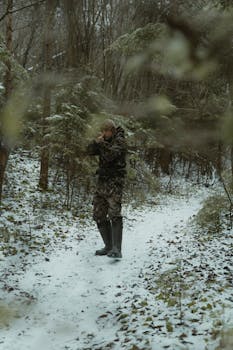The future of hunting communities in the United States is an evolving topic that touches on cultural, ecological, and technological dimensions. As society progresses, the way we engage with hunting is changing. With the rise of conservation awareness, digital innovations, and debates over land use, hunting communities face both challenges and opportunities.
Hunting has deep-rooted traditions in American history, providing not just sustenance but also fostering community bonds. While hunting offers recreational opportunities, the role of hunters in wildlife management and conservation is increasingly recognized. Understanding these factors can shed light on future trends in hunting communities.
This article explores various aspects shaping hunting communities’ future, examining conservation efforts, technological advancements, changing demographics, and the importance of education and advocacy. By analyzing these elements, we can better understand where hunting communities may be headed.
Conservation Efforts and Their Impact
Conservation has become a cornerstone of modern hunting, influencing practices and philosophies within hunting communities. Organizations like Ducks Unlimited and the Rocky Mountain Elk Foundation play significant roles. Their initiatives promote habitat restoration, ensuring sustainability.
These organizations emphasize the connection between hunters and wildlife conservation, enhancing public perceptions of hunting. As more hunters advocate for responsible practices, communities are increasingly recognized as stewards of the land. This shift has profound implications for future hunts and regulations.
Furthermore, conservation efforts enhance biodiversity, benefiting ecosystems and the species within. The collaborative approach between wildlife agencies, hunters, and conservation groups demonstrates a unified stance on preserving nature while allowing regulated hunting. This teamwork may shape future laws and hunting accessibility.
Advancements in conservation technology also play a pivotal role. Tools such as drones for monitoring wildlife and apps for tracking populations are increasingly used. As these technologies evolve, they will reshape hunting strategies, offering more precise and effective methods for sustainable hunting.
Ultimately, the emphasis on conservation will continue to cultivate a sense of responsibility within hunting communities. As new members join, they bring fresh perspectives, ensuring that the principles of conservation stay at the forefront of hunting practices.
The Digital Revolution and Hunting
The rise of digital technology has transformed communication, information sharing, and hunting methods in profound ways. From online forums to mobile apps, hunters can connect and share experiences effortlessly. These platforms foster camaraderie and knowledge exchange.
Mobile apps are revolutionizing hunting logistics, providing weather updates, mapping capabilities, and even safety features. Such innovations make it easier for both seasoned and novice hunters to prepare more effectively. This evolution can inspire younger generations to take up hunting, increasing community engagement.
Moreover, social media platforms are pivotal for sharing success stories, promoting hunting ethics, and advocating for conservation. These digital spaces allow varying perspectives to be communicated, enriching discussions within and beyond communities. Influencers and advocates utilize these platforms to illuminate hunting’s positive impact.
As technology continues to advance, regulations surrounding its use may also evolve. Discussions around ethical hunting practices in the context of digital tools, such as drones and trail cameras, will shape future guidelines. Finding equilibrium will be essential to maintain the sport’s integrity.
Ultimately, the digital revolution offers exciting opportunities for hunting communities. The integration of technology can enhance the experience while ensuring responsible hunting practices persist as a priority.
Changing Demographics: A New Generation of Hunters
The demographics of hunters in the U.S. are rapidly shifting. Younger generations are increasingly interested in hunting, with diverse backgrounds and motivations. This transition represents a critical turning point for hunting communities.
In particular, millennials and Generation Z are driven by eco-consciousness and a desire for sustainable food sources. Many view hunting as a means of connecting with nature and understanding food origins. As a result, hunting communities may welcome a broader range of perspectives.
Furthermore, increased multicultural engagement in hunting fosters inclusiveness and awareness. As diverse voices enter the community, they bring unique experiences and practices, enriching the hunting culture. This diversity can help promote conservation and ethical hunting practices.
Additionally, more women are taking up hunting than ever before. Female hunters actively participate, bringing new ideas and influences into the fold. This growing representation can reframe traditional hunting narratives, leading to a more contemporary community dynamic.
Combining these factors, the future of hunting communities appears vibrant and diverse. By embracing the changing demographics, communities can innovate, adapt, and thrive in an evolving landscape.
Education and Advocacy: Raising Awareness
Education plays a vital role in shaping hunting communities’ future. As new hunters enter the fold, comprehensive education around ethical practices, safety, and conservation becomes essential. This foundation can help maintain hunting’s longstanding tradition.
Advocacy efforts focusing on responsible hunting practices can strengthen community bonds and public perceptions. Crafting campaigns that address common misconceptions about hunting can elucidate its benefits. Engaging with the public fosters understanding and support for responsible hunting initiatives.
Moreover, educational programs targeting youth are key. Initiatives like “Hooks and Bullets” teach children the fundamentals of outdoor activities, promoting a love for nature through hands-on experiences. Such programs cultivate future generations of responsible hunters.
Collaborations between hunting organizations, schools, and community groups can also enhance educational outreach. Workshops, training sessions, and outdoor events can instill a sense of responsibility, respect, and passion for the environment. These combined efforts contribute to a more informed populace.
Together, education and advocacy initiatives will significantly impact the sustainability and viability of hunting communities. Knowledgeable hunters are more likely to engage in ethical practices and advocate for conservation, ensuring future landscapes remain intact.
Wildlife Management: Collaboration and Regulation
Wildlife management is a crucial aspect of hunting, ensuring healthy ecosystems and sustainable practices. Policy changes driven by science and collaboration may redefine hunting regulations, impacting how communities interact with nature. This collaborative approach highlights the necessity of mutual understanding and respect among stakeholders.
Hunting communities increasingly collaborate with government agencies to hire wildlife biologists and conservation experts. This trend enhances wildlife management strategies, leading to data-driven decisions regarding hunting seasons and limits. Consequently, hunters can actively contribute to sound wildlife practices.
Additionally, local involvement in wildlife management fosters a sense of ownership among hunting communities. By participating in monitoring populations, habitat restoration, and public outreach, hunters can reinforce their roles as stewards of the land. This connection nurtures a relationship built on respect for both the environment and wildlife.
As regulations continue to evolve, keeping hunters informed on policy changes is paramount. Active engagement through discussions, public comments, and participation in government meetings can further empower communities. A unified voice ensures that hunting rights are preserved while promoting ecological responsibility.
In essence, collaboration in wildlife management fosters healthier ecosystems while maintaining a harmonious relationship between hunters and wildlife. A solid framework will ensure that both communities and wildlife thrive for generations to come.
Ethics and the Future of Hunting
As hunting continues to adapt, ethical considerations remain vital in shaping its future. The principles guiding hunting practices must evolve alongside societal values and environmental awareness. Discussions around ethics could solidify hunting’s place in modern conservation efforts.
Transparency and accountability can set a precedent for ethical hunting practices. Encouraging hunters to share their experiences, techniques, and rationale cultivates an environment focused on respect for wildlife. Adopting robust ethical guidelines can build trust within hunting communities and the wider public.
Moreover, open dialogues about controversial practices, such as trophy hunting, can foster understanding and highlight differing viewpoints within the hunting community. Through respectful discussions, ethical standards can be refined, ensuring a shared commitment to responsible hunting.
Encouraging mentorship opportunities within hunting communities can also promote ethical practices. Experienced hunters can guide newcomers, sharing important lessons on respect for wildlife, conservation, and ethical considerations. This mentorship ensures that ethical values are passed onto future generations.
In summary, nurturing ethical practices will play a key role in the future of hunting communities. As ethics guide behavior, they can help fortify connections between hunters and conservation while enriching the hunting culture as a whole.
Conclusion
The future of hunting communities in the United States is a multi-faceted landscape shaped by conservation, technology, demographics, education, collaboration, and ethics. As we embrace these changes, a renewed commitment to responsible hunting practices emerges. Engaging new voices will ensure that long-standing traditions evolve while staying rooted in sustainability. Looking forward, hunting communities can foster connections that reflect the diverse interests and values of future generations.
As communities develop and adapt, critical conversations surrounding hunting will serve to reinforce community bonds. Ultimately, focusing on sustaining wildlife and the environment will preserve hunting for years to come. The future looks bright for hunting communities as they navigate these exciting changes!


